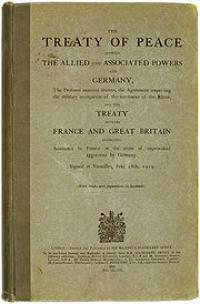|
|
|
The Treaty of Versailles was one of the peace treaties at the end of World War I. It ended the state of war between Germany and the Allied Powers. It was signed on 28 June 1919, exactly five years after the assassination of Archduke Franz Ferdinand. The other Central Powers on the German side of World War I were dealt with in separate treaties. Although the armistice signed on 11 November 1918 ended the actual fighting, it took six months of negotiations at the Paris Peace Conference to conclude the peace treaty. The treaty was registered by the Secretariat of the League of Nations on October 21, 1919, and was printed in The League of Nations Treaty Series. Of the many provisions in the treaty, one of the most important and controversial required Germany to accept sole responsibility for causing the war and, under the terms of articles 231 � 248 (later known as the War Guilt clauses), to disarm, make substantial territorial concessions and pay heavy reparations to certain countries that had formed the Entente powers. The total cost of these reparations was assessed at 132 billion Marks (then $31.4 billion, £6,600 million) in 1921 which is roughly equivalent to US$ billion in , a sum that many economists at the time, notably John Maynard Keynes, deemed to be excessive and counterproductive and would have taken Germany until 1988 to pay. The Treaty was undermined by subsequent events starting as early as 1932 and was widely flouted by the mid-1930s. The result of these competing and sometimes conflicting goals among the victors was compromise that left none contented: Germany was not pacified or conciliated, nor permanently weakened. This would prove to be a factor leading to later conflicts, notably and directly the Second World War. |




 RSS
RSS